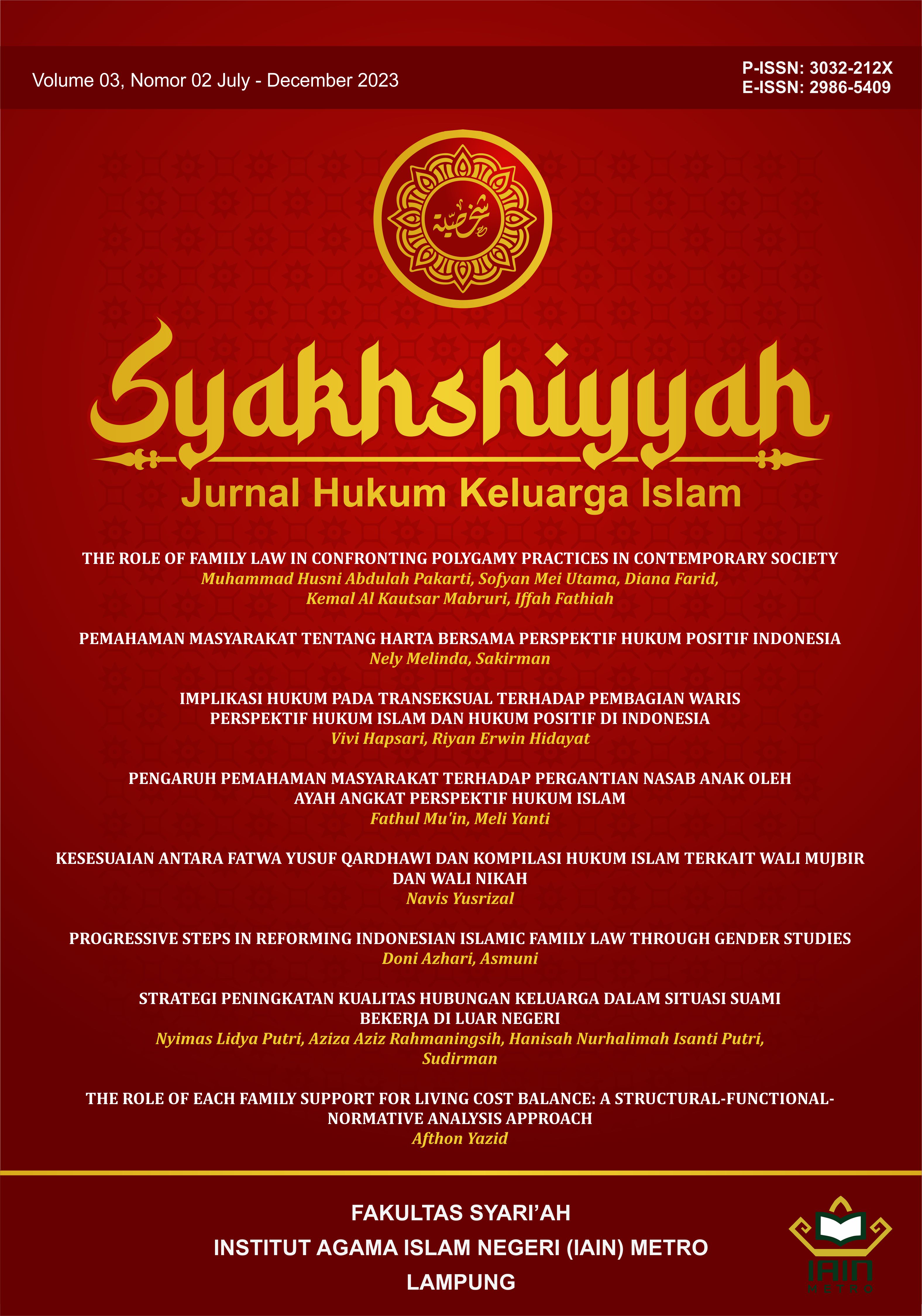Implikasi Hukum pada Transeksual terhadap Pembagian Waris Perspektif Hukum Islam dan Hukum Positif di Indonesia
DOI:
https://doi.org/10.32332/syakhshiyyah.v3i2.7714Keywords:
Transsexual, Law , InheritanceAbstract
Transsexual in Indonesia are considered deviants, although the phenomenon of Transsexual in our society is no longer a new fact, deviant behavior is still considered abnormal and even considered a disease. Transsexuals are prohibited by Islam as stated in the Al-Qur'an and hadith, this is contrary to the positive law in Indonesia where Transsexuals enjoy legal legality. The legality and legal status obtained by Transsexuals in Positive Law in Indonesia has a big impact in various aspects. One aspect that is affected by the existence of Transsexuals is Inheritance Law. This research aims to determine the legal implications for Transsexual perpetrators in the distribution of inheritance from the perspective of Islamic Law and Positive Law in Indonesia. This research is normative legal research which refers to literature studies in the field of law using a conceptual problem approach and a case approach. The research findings show that the law of changing sex on purpose is not permissible according to Islamic law. This is in accordance with the word of God in the Qur'an, the Hadith of the Prophet, and the MUI Fatwa. With the legalization of a Court Order, it raises two implications or possibilities that lead to opposite results. On the one hand, the distribution of inheritance must be in accordance with the initial gender at birth and on the other hand, the distribution of inheritance can be adjusted to the new gender in accordance with the legality obtained from the court's decision.
References
Abu Ameenah Philips, Islam dan Homoseksual, Jakarta: Pustaka Zahra, 2003.
Amir Syarifuddin, Hukum Kewarisan Islam, Jakarta: Kencana, 2004.
Baeti Rohman, Al-Qur’an dan Civil Society Kecerdasan Kewargaan Perspektif Al- Qur’an, Jakarta: Tarbiyah Press, 2020.
Beni Ahmad Saebani, Fiqh Mawaris, Bandung: CV.Pustaka Setia, 2009.
Direktori Putusan Mahkamah Agung Republik Indonesia.
Gibtiah, Fiqh Kontemporer, Jakarta: Prenada Media Group, 2016.
Hadis Shahih Bukhari No. 5435, Hadist.id.
Hadis Shahih Bukhari No. 5436, Hadist.id.
Hanny Puspita Ariani, Asuhan Kebidanan pada Perempuan dan Anak dalam Kondisi Rentan, Malang: Rena Cipta Mandiri.
HR. Sunan Ibnu Majah No. 1893, Hadist.id.
Jaya Suprana, Kelirumologi Genderisme, Jakarta: Elex Media Komputindo, 2014
Jeffrey S. Nevid, Gender dan Seksualitas Konsep dan Aplikasi Psikologi, Perpustakaan Nasional RI: Nusamedia, 2021.
Linda Rae Bennett dkk, Seksualitas di Indonesia, Politik Seksual, Kesehatan, Keragaman, dan Representasi, Terj. Jakarta: Yayasan Pustaka Obor Indonesia.
Majelis Ulama Indonesia, Himpunan Fatwa MUI Sejak 1975, Jakarta: Erlangga, 1980.
Nur Hafni Kurniawati dkk, “Transeksual Dalam Perspektif Hukum Kesehatan” dalam Jurnal Spektrum Hukum, Vol. 16, No. 2, 2019.
R. Subekti dan R. Tjitrosudibio, Kitab Undang-Undang Hukum Perdata, PT. Balai Pustaka: Jakarta, 2017.
Regiandra Kurnia, “Pendapat Majelis Ulama Indonesia Kota Pontianak Tentang Pembagian Harta Warisan Kepada Ahli Waris Yang Transeksual dalam Persfektif Hukum Islam” dalam Jurnal Hukum Tanjungpura, Vol. 3, No. 1, 2020.
Rilla Sovitriana, Kajian Gender Dalam Tinjauan Psikologi, Jawa Timur: Uwais Inspirasi Indonesia, 2020.
Sinyo, Anakku Bertanya tentang LGBT, Jakarta: PT. Elex Media Komputindo, 2014
Stephanus Agung Sujatmoko, Muchlis Achsan Udji Sofro, Kembali Kodrati, Jakarta: PT. Gramedia, 2016.
Syaikh Al-‘Allamah Muhammad bin Abdurrahman ad-Dimasyqi, Fiqih Empat Mazhab, Bandung: Hasyimi, 2012.
Tim Redaksi Nuansa Aulia, Kompilasi Hukum Islam, Cet. 8, Bandung: CV. Nuansa Aulia, 2020.








